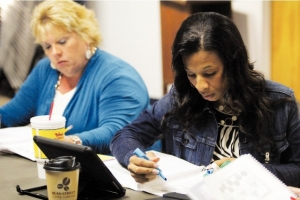Schools try new planning process
By Phyllis Moore
Published in News on October 27, 2012 11:30 PM

News-Argus/TROY HERRING
Gail Sasser, left, and Trammennieo Cooper, teaching/learning coaches, attend a training session to learn more about the state's "3-D Reading" program in grades K-3.
Teacher lesson plans are nothing new.
But this year, the process got a lot more complicated.
In June 2010, North Carolina adopted the Common Core Standards for math and English language arts in all grades. The initiative is an effort to establish educational standards in those subjects. So far, 45 states have voluntarily adopted the plan.
It doesn't end there, though. The state also approved N.C. Essential Standards, which encompasses all other subject areas.
"When it was adopted, Common Core was just two subjects -- English language arts and math. Essential Standards is everything else," said Dr. Sandra McCullen, associate superintendent for curriculum and instruction in Wayne County Public Schools. "What we call N.C. Standard Course of Study, our map for teaching, this is all replacing that."
The sweeping changes have been overwhelming, Mrs. McCullen said, because they are all happening simultaneously.
"This is the first year that all of the curriculums have been changed at the same time," she said. "Before, there's been rotating schedules -- math and English one year, science and math the next."
This school year, she said, everything is being assessed, including information and technology skills and English as a Second Language. As a result, the focus is more narrow.
The process has been two years in the making, Mrs. McCullen said. It started when the state received the Race to the Top grant and continued as consultants and professional development opportunities aided districts in preparing for the changes.
"The last year and a half all of our certified staff as well as teacher assistants were being provided staff development about Common Core and Essential Standards and how to roll that out in the classrooms," she said.
It has been a daunting task, she added.
"It truly is a leap of faith. It's the biggest change that I have seen in my entire career. It's a curriculum change of all K-12 subject areas, so every teacher needs to know their content area very well."
Among the highlights of the new standards are additional exams in high school subjects that did not formerly require them.
Also, high school students must now pass Algebra II to graduate.
And the reading assessment requires students in third grade to have a pre-test and indicates that those not at the appropriate reading level will not be promoted.
But perhaps the biggest buzz among educators is the stringency imposed on lesson plans.
"Planning what you're going to go from year to year is very important," Mrs. McCullen said. "Board policy says that we can say that our students are receiving lessons by grade level or subject areas that have been adopted by the state of North Carolina."
Even educators who have been teaching for a long time are having to revamp their lesson plans, she said.
"Everybody is having to do something different," Mrs. McCullen said.
Traditionally, throughout the school year, the district schedules early dismissal days for students, during which teachers are offered professional development opportunities. This year, the bulk of those days have been devoted to Common Core and Essential Standards.
"Our teachers have stepped up to the plate and are providing the leadership at school sites as well as the district level to provide the Common Core and Essential Standards in the appropriate way," she said. "It's a challenge. Any time you change, it's a challenge to get everybody to adopt it."
Wayne County, she noted, should be applauded, as it is viewed as a "model" district because of its staff development opportunities.
"The biggest challenge for us is to make sure everybody knows what the Common Core is and what students need to be taught in the classroom," Mrs. McCullen said.
According to the Department of Public Instruction website, lesson plans are not designed as a "cookie cutter" approach to implementing the standards, but rather a springboard to devise specific goals and objectives that encompass the individual needs of the students as well.
"Everybody's got to have the basics, what we used to call the 3 R's -- reading, writing and arithmetic," Mrs. McCullen said. "It's still there. You still have to address these subjects. It's just at a different level from how we were taught."
